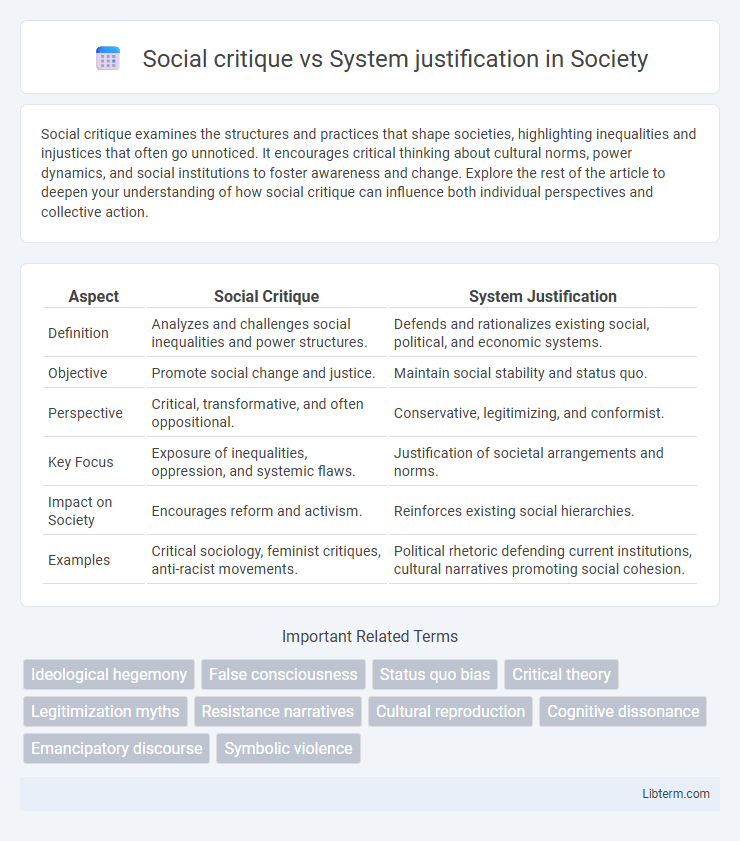Social critique examines the structures and practices that shape societies, highlighting inequalities and injustices that often go unnoticed. It encourages critical thinking about cultural norms, power dynamics, and social institutions to foster awareness and change. Explore the rest of the article to deepen your understanding of how social critique can influence both individual perspectives and collective action.
Table of Comparison
| Aspect | Social Critique | System Justification |
|---|---|---|
| Definition | Analyzes and challenges social inequalities and power structures. | Defends and rationalizes existing social, political, and economic systems. |
| Objective | Promote social change and justice. | Maintain social stability and status quo. |
| Perspective | Critical, transformative, and often oppositional. | Conservative, legitimizing, and conformist. |
| Key Focus | Exposure of inequalities, oppression, and systemic flaws. | Justification of societal arrangements and norms. |
| Impact on Society | Encourages reform and activism. | Reinforces existing social hierarchies. |
| Examples | Critical sociology, feminist critiques, anti-racist movements. | Political rhetoric defending current institutions, cultural narratives promoting social cohesion. |
Understanding Social Critique
Social critique involves the analysis and evaluation of social structures, highlighting inequalities and power imbalances to advocate for change, while system justification refers to the cognitive process that rationalizes and defends existing social arrangements. Understanding social critique requires recognizing its role in challenging dominant ideologies and exposing systemic injustice, promoting awareness and critical thinking. Key theories in social critique include Marxism, critical race theory, and feminist theory, which emphasize the importance of questioning societal norms to drive social transformation.
Defining System Justification Theory
System Justification Theory posits that individuals have a psychological motivation to defend and rationalize existing social, economic, and political arrangements, even when these systems perpetuate inequality or disadvantage. This theory contrasts with social critique, which challenges and seeks to change unjust structures by highlighting systemic flaws and promoting social justice. Understanding system justification highlights why people may resist social change efforts despite recognizing social injustices.
Key Differences Between Social Critique and System Justification
Social critique involves analyzing and challenging the power structures and inequalities embedded within a society, emphasizing the need for change and reform. System justification refers to the psychological process by which individuals defend and rationalize existing social, economic, and political systems, even when these systems may reinforce inequality. Key differences lie in their orientations: social critique seeks transformation and exposes systemic flaws, whereas system justification promotes stability and acceptance of the status quo.
Historical Perspectives on Social Critique
Historical perspectives on social critique reveal its roots in challenging entrenched power structures and societal norms, as seen in the works of Karl Marx and Michel Foucault, who dissected class struggles and power relations. Social critique often opposes system justification, which functions to legitimize and maintain existing social orders through ideology, culture, and institutions. This tension highlights the evolving dynamics between transformative social movements and the entrenched mechanisms that sustain institutional stability throughout history.
Psychological Roots of System Justification
System justification originates from psychological needs to reduce uncertainty and cognitive dissonance by defending existing social, economic, and political structures. This phenomenon is driven by motives to maintain a sense of stability, control, and positive social identity, even when systems are unfair or unequal. Social critique challenges these deep-rooted psychological processes by highlighting structural injustices, prompting individuals to question and potentially resist system-endorsed beliefs.
Impacts on Social Change Movements
Social critique challenges prevailing social norms by exposing inequalities, fueling awareness and mobilizing collective action in social change movements. System justification reinforces existing social arrangements by promoting acceptance and minimizing perceived social injustices, which can hinder mobilization and slow reform efforts. The tension between social critique and system justification critically shapes the dynamics and effectiveness of movements aiming for societal transformation.
Media’s Role in Shaping Perspectives
Media plays a pivotal role in shaping public perspectives by either promoting social critique or reinforcing system justification. Through selective framing, agenda-setting, and representation, media can highlight social inequalities and injustices or normalize existing power structures and status quo. Research shows that media narratives significantly influence audience beliefs about social change, often mediating support for reform or acceptance of systemic conditions.
Social Critique in Contemporary Society
Social critique in contemporary society challenges existing power structures and highlights systemic inequalities often overlooked by mainstream narratives. It reveals the contradictions within cultural, political, and economic systems, encouraging transformative social change by questioning dominant ideologies. This critical perspective mobilizes collective awareness and activism to address issues such as racial injustice, economic disparity, and environmental degradation.
Barriers to Challenging System Justification
Barriers to challenging system justification include cognitive dissonance, where individuals experience psychological discomfort when confronted with information that contradicts their existing beliefs about social systems. Motivated reasoning leads people to defend the status quo by selectively accepting information that reinforces their support for current social, economic, or political structures. Social identity theory also plays a role as individuals derive self-esteem from their group membership, making it difficult to criticize systems that benefit their in-group, even when they recognize systemic inequalities.
Pathways Toward Social Transformation
Social critique challenges existing power structures by highlighting inequalities and advocating for justice, while system justification maintains status quo by rationalizing social arrangements as fair or inevitable. Effective pathways toward social transformation involve critical consciousness, collective action, and disrupting legitimizing ideologies that support systemic oppression. Empowering marginalized groups through education and mobilization fosters resistance against system justification, enabling structural change and social equity.
Social critique Infographic

 libterm.com
libterm.com